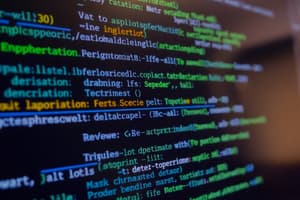Podcast
Questions and Answers
What are the typical programming constructs in procedural programming?
What are the typical programming constructs in procedural programming?
Data (primitive and compound), control, modularity, recursion.
Which of the following are components of evaluation in the course?
Which of the following are components of evaluation in the course?
- Midterm Test (correct)
- Continuous Assessment – Lab (correct)
- Final Project
- Continuous Assessment – Theory (correct)
What is the purpose of analyzing a given program?
What is the purpose of analyzing a given program?
To trace, identify coding errors and debug them.
Global state in procedural programming is always safe to use.
Global state in procedural programming is always safe to use.
What is meant by modularity in programming?
What is meant by modularity in programming?
Which textbooks are referenced in the course?
Which textbooks are referenced in the course?
Procedural programming in C involves breaking down a program into manageable blocks known as ______.
Procedural programming in C involves breaking down a program into manageable blocks known as ______.
What does the structure of C programs include?
What does the structure of C programs include?
Which of the following languages are considered procedural programming languages?
Which of the following languages are considered procedural programming languages?
Flashcards are hidden until you start studying
Study Notes
Course Overview
- Course titled "Procedural Programming Using C" focusing on core programming constructs and algorithms.
- Key learning outcomes designed to build foundational programming skills including error analysis and program development.
Course Outcomes
- Understand typical programming constructs: data types (primitive and compound), control structures, modularity, recursion.
- Develop skills in program analysis, debugging, and tracing coding errors.
- Apply programming constructs effectively in computer program development.
- Implement suitable algorithms for various problem scenarios.
Syllabus Breakdown
- Unit 1:
- Overview of Physical Computing, Arduino hardware/software architecture.
- Structure and data types in C, including I/O and control structures.
- Unit 2:
- Concept of arrays, functions, storage classes, scope, recursion, and pointers.
- Emphasizes pointer arithmetic, dynamic memory allocation.
- Unit 3:
- Structures, unions, data storage, and string manipulation.
- Introduces files, streams, C preprocessor directives, and command line arguments.
Textbooks & References
- Primary textbook: "Beginning C for Arduino" by Jack Purdum, Second Edition.
- Notable reference texts include:
- "C in a Nutshell" by Peter Linz and Tony Crawford.
- "Modern C" by Jens Gustedt.
- "Effective C" by Robert C. Seacord.
- "Tiny C Projects" by Daniel Gookin.
Evaluation Plan
- Total assessment comprises midterm tests, quizzes, continuous assessments (theory and lab), and a final lab-based examination.
- Weightage breakdown:
- Midterm Test: 20 out of 50.
- Two quizzes: 5 each out of 10.
- Continuous Assessment: Various components totaling 40 marks.
- Internal Marks: 70 total, with End Semester Exam worth 30 out of 50 marks.
Procedural Programming Concepts
- Procedural programming in C divides programs into manageable functions or procedures, each performing specific tasks sequentially.
- Core programming components:
- Sequence: Execution of code in a linear fashion.
- Selection: Directing program flow based on conditions.
- Iteration: Repeated execution of code blocks.
- Emphasis on modularity to facilitate maintenance and reusability of code.
- Distinction between data and procedures is crucial, differing from object-oriented programming.
- Global state allows data access across different program areas, offering flexibility but introducing potential risks.
- C, Fortran, and Pascal are examples of procedural programming languages.
Studying That Suits You
Use AI to generate personalized quizzes and flashcards to suit your learning preferences.




